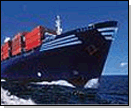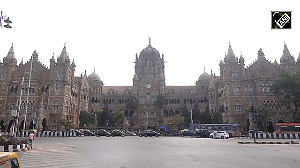 W
While growth in global trade, especially oil trade, has helped the Indian shipping industry in improving its financial performance in the past two years, sustainability is still an issue.
Combined with that, strict regulations of the shipping regulatory authority, the IMO, is likely to have a major effect on the shipping industry's growth prospects going forward.
|
Indian National Shipowners' Association (INSA) Wish List |
|
|
Customs duty exemption for imported ship spares and ship repair equipments |
|
|
Exemption for certain categories of vessels from 5% customs duty |
|
|
Indian seafarers working on Indian ships should get equal income-tax treatment as those Indian seafarers working on foreign flag ships. |
| Budget 2002-03 |
|
Budget 2003-04 |
|
Budget 2004-05 |
|
|
|
|
|
|
Increase in amount transferred to special reserves for capacity expansion.
Shipping companies out of MAT purview.
Corporatisation of major ports. |
|
The government has allocated Rs 110 bn towards renovation/modernisation of airports and ports.
Dividend tax removed at the hand of the shareholders. |
|
Concessional regime under Section 33AC to be withdrawn and companies to be granted option to pay tonnage tax or normal corporate tax on profits.
Setting up of an International Container Trans-shipment project at Kochi.
Service tax has been raised from 8% to 10%. Further, a surcharge of 2% on account of education cess will be imposed on this tax. |
|
|
|
|
[Read more on Budget 2004-05] | |
| Key Positives |
|
|
|
Rising global trade: Strong global economic growth led by China and the US is expected to result in above average growth in global oil consumption during FY06 as well. This will have direct benefits for the Indian shipping industry. It is estimated that the 2.5% increase in oil demand forecast by the IEA for 2005 should typically lead to around 4.0% to 5.0% increase in tanker demand.
|
|
|
Shipping regulations: As per IMO regulations, approximately 32 million deadweight tonnes (mdwt), or 10 percent, of the existing world tanker fleet is expected to be banned from worldwide trading when the regulations come into force on April 5, 2005. A further 87 mdwt, or 27 percent, of the world tanker fleet is expected to be excluded from the majority of oil tanker trades by 2010. This is a positive for the Indian shipping sector, as over the long term, regulations like these will enable shipping companies to maintain strict quality and safety controls.
|
|
|
Government's thrust on oil exploration: The government of India has plans to conclude NELP-V in 4 months instead of 6 as was in case of NELP IV and this gives a clear indication about the seriousness of ensuring oil security for the country. Under NELP V, 6 blocks in deepwater, 2 shallow water and 12 on land blocks, involving an investment of US$ 1 bn have been offered. This is likely to prove beneficial for the Indian shipping industry going forward.
|
|
|
Tonnage-tax regime: In the previous budget, the government had announced a tonnage tax regime for Indian shipping companies under which tax dues would be based on the gross registered tonnage (grt). This is in contrast to the earlier regime of taxes on profits. When implemented, this tonnage tax would lessen the tax burden on Indian shipping companies and enable them to apportion a larger portion of cash flows towards fleet expansion.
|
|
|
Privatisation of ports: Another key focus area of the government is the privatization of ports. Though this is a long-term process, the move is a step in the right direction. | |
|
| Key Negatives |
|
|
|
Uncertainty regarding sustainability of global economic growth: While growth in global trade has helped Indian shipping companies to improve their financial performance, sustainability is still an issue. Especially with the Japanese and Southeast Asian economies still vulnerable to a downturn, and that the Chinese economy is on its way for a slowdown, demand for tonnage could fall. Also, any 'shock' in form of the US economy slowdown might have a negative impact on the shipping industry's performance in the future This in turn would hurt freight rates and earnings for shipping companies.
|
|
|
Small size: At just 1.2%, the Indian shipping fleet is minuscule when compared with world tonnage. This has resulted in consistent fall in market share over the years. | |

This is part of Equitymaster's Budget 2005-06 series. Equitymaster.com is one of India's premier finance portals. The Web site offers a user-friendly portfolio tracker, a weekly buy/sell recommendation service and research reports on India's top companies.
 While growth in global trade, especially oil trade, has helped the Indian shipping industry in improving its financial performance in the past two years, sustainability is still an issue.
While growth in global trade, especially oil trade, has helped the Indian shipping industry in improving its financial performance in the past two years, sustainability is still an issue.








 © 2025
© 2025